Take One Teaspoon of Science, a Pinch of Fiction, Stir
A Roundtable Discussion With Lois McMaster Bujold, Tony Daniel and Jack McDevitt Note: This feature is the transcript from a live event
produced by SciFi.com for HarperCollins.
The live event took place online during the annual Internet-only
science fiction/fantasy conference, EosCon 4.0. The topic of
this panel was "Take One Teaspoon of Science, a Pinch of Fiction, Stir"
The panelists were bestselling fantasy authors
Lois McMaster Bujold,
Tony Daniel,
and Jack McDevitt.
Note: This feature is the transcript from a live event
produced by SciFi.com for HarperCollins.
The live event took place online during the annual Internet-only
science fiction/fantasy conference, EosCon 4.0. The topic of
this panel was "Take One Teaspoon of Science, a Pinch of Fiction, Stir"
The panelists were bestselling fantasy authors
Lois McMaster Bujold,
Tony Daniel,
and Jack McDevitt.
Moderator: Hi everyone, welcome to EOSCON 4.0. I'm your Moderator for SCIFI. This hour we're chatting with writers Lois McMaster Bujold, Tony Daniel and Jack McDevitt about the importance of the science (and the technology!) to the fiction.
Moderator: So I know that the official SF definition these days is "speculative fiction." Meaning -- it doesn't really have to be about science. Is that a good thing or a bad thing?
Tony Daniel: Real science is pretty open-ended.
Lois McMaster Bujold: It's good in that it widens the possibilities. I don't regard it as carte blanche to write bad science and expect to get away with it. Not with our readers.
Tony Daniel: Particularly with quantum physics and such, what is speculative and what is science can become blended. You can't get away with just saying anything, though.
Moderator: Why are "fantasy" and "science fiction" grouped together in a marketing genre? From a substantive point of view, aren't they polar opposites?
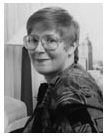
|
Tony Daniel: As far as I'm concerned, anything that explains the world a little better, elucidates something, is real. Using science as a way to tell a story is exactly as true or as false as the story you tell.
Lois McMaster Bujold: SF versus fantasy... for me, the dividing gray area is the existence of the supernatural.
Tony Daniel: The best fantasy is not a way to escape either, but a way to have a look at things and get a better perspective.
Lois McMaster Bujold: Although if the supernatural is posited to literally exist... it becomes the natural, in a way.
Moderator: Is there anything you would consider "unrealistic" science?
Tony Daniel: Whenever somebody uses the word "energy" and doesn't give me some rules for it, I know I'm in the land of the wacky.
Lois McMaster Bujold: "Realistic" is usually a matter of execution, not idea; still, we want effects to have causes, and the energy-budget to balance. That's a very modern demand, by the way.
Tony Daniel: I think it's modern because we're moderns, for better or worse.
Moderator: Jack? Your thoughts on this? Oops. Jack seems to have...disappeared.
Moderator: Is that science or the supernatural?
Moderator: Isn't it more important to be consistent than "scientific"....to pick out the rules of your world and stick to them?
Tony Daniel: Or, to put it another way, to establish a voice. You can also mess with a reader's mind by being plausible, and then pulling the rug out...
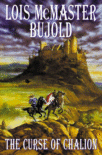
|
Jack McDevitt: Testing... one, two...
Moderator: He's baaaaaack!
Moderator cues scary music.
Moderator: Here's the question we're pondering, Jack: Isn't it more important to be consistent than "scientific"....to pick out the rules of your world and stick to them?
Tony Daniel: The thing about science is that it's fun to play with it, not daunting, if you care about your characters and the story you want to tell. It's the setting, in a way, for all SF.
Jack McDevitt: My preference is to stay with what's possible. But Homer didn't worry about that. So yes, I guess consistence is what counts if we're talking about what makes a decent narrative.
Lois McMaster Bujold: One can duck much which is daunting about the science in one's story by a careful selection of viewpoint. The lab's janitor, say, rather than the senior scientist...
Moderator: I've heard it said that Science Fiction is nothing more than Fantasy with pretensions. What do you all think of that definition?
Lois McMaster Bujold: I think the two "genres" are a continuum, myself. One blends into the other. Remember, genre itself is a 20th century invention. Before that, there were just books.
Jack McDevitt: It's too broad. It seems to be just an attack on both SF and fantasy, but it doesn't really say anything about the content of either.
Tony Daniel: I pretty much agree with that. But then ain't fiction life -- with pretensions?
Lois McMaster Bujold: Life with all the boring bits excised... Actually, no. Fiction has to make sense, life doesn't.
Moderator: But I think what this definition suggests is that for many people "science" is just an updated term for "magic."
Jack McDevitt: Science is the vehicle that gets me to the story, that makes the narrative possible. There are a lot of us who don't really write about "science", just a world in which science allows faster streetcars. I don't think there's anything new about that. We all realize it. To a degree.

|
Moderator: With the increasing levels of ignorance in modern America, do you think SF has a place anymore? To the average reader, isn't it all fantasy anyway?
Jack McDevitt: Nothing wrong with fantasy. The problem is with literacy levels, and SF, if chosen intelligently, can get reluctant kids reading. And it can be a weapon in the parents' arsenal as well.
Tony Daniel: I don't know if anybody is more ignorant than they've ever been. I seem to know less and less every day...
Lois McMaster Bujold: Magic done as a sort of technology is different in flavor from a supernatural -- religious, perhaps -- event, something that breaks into one's world from outside.
Jack McDevitt: Tony, what's probably happening is that you're discovering more and more about what's out there. Only the slow-witted think they know a lot.
Lois McMaster Bujold: Certainly the ratio of what I know to the ratio of what can be known gets more daunting daily.
Jack McDevitt: I don't know about you folks, but I've refused to leave the 20th century.
Moderator: How much background detail do you try for in your science (the stuff that doesn't make it into the book itself)?
Tony Daniel: I read a hell of a lot, but take very few notes. You have to percolate a story, not cook it according to directions -- I do, at least.
Lois McMaster Bujold: My technique is similar to Tony's: read, digest. If it's important, it'll surface, maybe.
Moderator: Have you ever had to throw away a good plot because the science was wrong/bad/inconsistent? What's the relationship between the plot and the science?
Tony Daniel: Are you kidding? Good plots are a lot less common than major scientific discoveries!
Lois McMaster Bujold: Not so far. That doesn't mean my science doesn't start out good and become bad, as the world changes.
Jack McDevitt: No. The narrative can usually be bent to fit the requirements of physics. Or whatever. But that's what happens when you only use science to arrive at a destination. The time machine always works.
Lois McMaster Bujold: The science... widens the ambit of the possible, to one's characters and plot.
Moderator: It seems as though in classic SF, the plot is really enabled by the science, no? Otherwise all the science is really a stage-prop.
Tony Daniel: Exactly what Lois said. The science is your friend, not your foe.
Jack McDevitt: Lois & Tony are dead right.
Lois McMaster Bujold: Speaking as a female, I certainly think science is my friend. Particularly medical science, but most of the others, as well.
Moderator: How does science start out good and "become" bad?
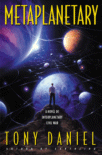
|
Lois McMaster Bujold: Well, here's one; the discovery that ulcers were caused by bacteria, not just stress, made a bit in one of my books obsolete. Well, it can be ignored by a sufficiently dedicated fan, but still.
Jack McDevitt: History can overtake a plot too. Tom Clancey's world, e.g., went south when the USSR went down.
Moderator: Unfortunately it didn't destroy his literary career.
Tony Daniel: History is the real enemy of a story's staying power.
Moderator: Is it easier to build a consistent world in a science fiction story or in fantasy?
Lois McMaster Bujold: Worldbuilding seems the same in both genres to me. Even when writing a medieval world, its technology must be consistent.
Jack McDevitt: I doubt there's much real difference. Although in straight-up SF, the rules are already there to the knowledgeable reader, at least to a degree. A fantasy writer has to lay them out. What are the wizard's limits?
Tony Daniel: Keeping an entire world in your head is hard no matter what, because it's all just something you're making up in the end.
Lois McMaster Bujold: Regarding staying power, that's where characterization can save you. People will read a book over for the characters, not for the ideas.
Tony Daniel: I think really good fantasy is actually probably more difficult than SF. But really bad fantasy is a lot easier, because readers forgive some pretty blatant plagiarism, it seems.
Lois McMaster Bujold: There are some hungry readers out there. But we can serve good food...
Jack McDevitt: It's sometimes hard to separate the fields. There's certainly a fair amount of fantasy in SF. FTL and time travel, for example.
Moderator: Why did the three of you choose to write in this particular genre? Was the "science" part a large part of the attraction for you as creative artists?
Tony Daniel: To piss off my English teachers...no. It's more like I had to write about things that matter to me. Science is a major way of thinking about my reality and presumably that of a lot of people alive these days.
Lois McMaster Bujold: I think the separation from my here-and-now was more of a driving factor, for me. Escape is under-rated as a reason for fiction, not that art should have to justify its existence by utilitarian measures.
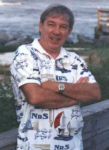
|
Lois McMaster Bujold: And -- Tony's right -- science does matter. Every day.
Moderator: What are some of the most interesting of the current scientific discoveries, things that you're sure you'll be seeing in the SF of the next couple of years?
Lois McMaster Bujold: I can't speak for anyone's SF but mine, I'm afraid, and that only to about the next half-chapter.
Tony Daniel: Okay, okay...back to track...nanotechnology. Lots more quantum weirdness as it comes to have effects in our daily lives...e.g. quantum computers and cryptology.
Jack McDevitt: More biotech, I suspect. The potential for advances and the natural inclination to yell Frankenstein should continue to fuel plots for a long time to come.
Lois McMaster Bujold: The medical stuff coming out of the genome project, though it may take longer to develop than some people think, looks pretty exciting. Every time I enter a modern hospital or clinic, I feel like a time-traveler.
Jack McDevitt: But who knows? Imagine HG Wells trying to predict the SF of the 20th century.
Moderator: To what extent is science fiction useful for examining moral implications of possible future tech developments?
Tony Daniel: That's sort of what we do...
Lois McMaster Bujold: That's almost the definition of science fiction. Now, whether we get right answers is a whole 'nother question.
Jack McDevitt: Tony's right again. We do cautionary tales.
Jack McDevitt: Lois, probably just asking the questions is a sufficient service.
Lois McMaster Bujold: But even if we don't get the "right" answers, I like to think the exercise is useful for our minds.
Tony Daniel: That's the fun of it all -- thinking about what it really means to human beings...and are there going to be human beings...
Jack McDevitt: There will be humans for a long time. Any species that takes care of its damaged kids and pushed whales back into the ocean is going to have staying power. And is worth saving.
Lois McMaster Bujold: I agree with Jack. The survival of our particular culture is more problematic.
Moderator: We've almost come to the end of our hour so I'd like to ask: what can we look forward to from each of you in the near future? Books, I mean!
Tony Daniel: I'm working on the second part of my thingie that started with Metaplanetary, which is currently available, by the way. Interplanetary civil war a thousand years from now, that sort of thing...and all literary...
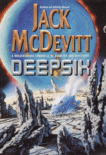
|
Lois McMaster Bujold: Ah! For me, it's a foray into fantasy -- The Curse of Chalion will be out August 2001 from Eos/HarperCollins. Rather than waving my arms around and trying to describe it, let me just direct everyone to Eos Books, where there are free sample chapters up now!
Moderator: Tony, Jack, Lois -- thanks so much for spending this hour with us. Thanks to everyone in the audience too!
Jack McDevitt: Thanks, all. Energetic audience there---!!!
Tony Daniel: You all look great on the satellite downlink from the spy satellite!
Copyright ©2001 by HarperCollins. All Rights Reserved. Reprinted with permission. Reproduction or dissemination of this transcript in any manner whatsoever is strictly prohibited.
Photograph of Lois McMaster Bujold by Beth Gwinn.
Photograph of Tony Daniel by Rika Daniel.
Return to the August 2001 issue of The IWJ.
More from Writers Write
